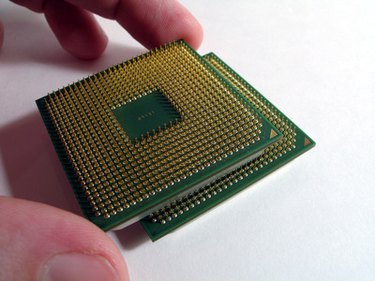
One of the major producers of computer chips for personal computers is California-based Intel Corporation. Intel has been a household name for decades, powering some of the most advanced computers with its Pentium, Core and Xeon chips. However, there are disadvantages to using certain Intel chips that computer manufacturers and buyers must consider.
Price
Video of the Day
One disadvantage of Intel processors is the price. As a highly recognizable brand name, Intel's products often sell for more than comparable counterparts from lesser-known microprocessor makers. In addition, new Intel processors may demand a price premium, falling to more competitive levels only once the company has introduced an even newer chip. This can drive up the cost of new computers and make older models with Intel chips less attractive to budget-oriented buyers.
Video of the Day
Availability
Just as Intel processors may demand a price premium, new models may be difficult to acquire in large quantities. This is especially true of processors intended for use in popular consumer desktop and notebook computers, with many different computer manufacturers competing for the same limited stock of processors. As a manufacturer, relying on Intel processors may delay the release of new models to the public.
Power Consumption
While Intel does procude a line of processors for notebook computers that draw relatively little power, other models intended for desktop computers use a significant amount of electricity. Coupled with the power needs for fans or a liquid cooling system pump, this can cause a computer using Intel chips to consume a large amount of electricity, increasing the operating cost and contributing to strain on the electric grid.
Heat
Another issue with some Intel processors, such as the Core 2 Duo, is heat. Some of Intel's more powerful multicore processors produce a great amount of heat, requiring multiple fans for cooling. Besides the aforementioned energy usage, heat can decrease the durability of the processor or make a notebook computer uncomfortably hot to the touch.